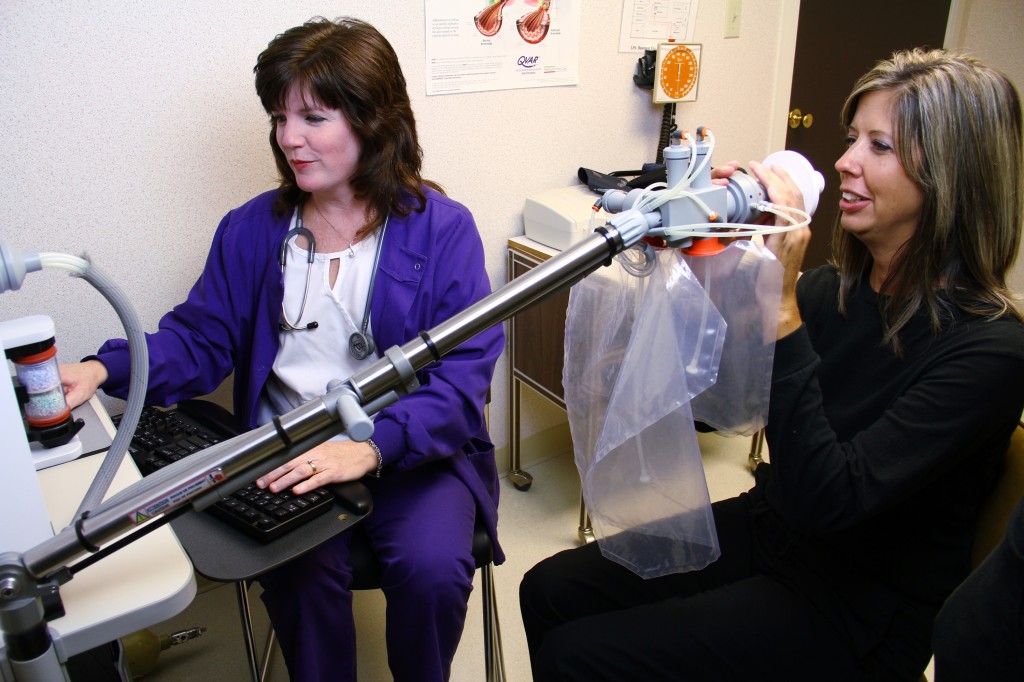 Asthma
Asthma
Asthma is a disease caused by inflammation of the windpipes. In this condition, the inflammation is almost always triggered by allergic reactions to microscopic inhaled particles. About 25% of adults have some seasonal allergies (like hay fever) but about 11% have asthma. Symptoms of asthma include coughing, wheezing, breathlessness, and chest tightness. Asthma symptoms tend to come and go over time; many patients can identify exactly what makes their asthma get worse.
The most important part of treating asthma is reducing exposures to the things that set it off. Additionally, certain inhalers and other medications are commonly used to reduce the irritation in the windpipes. Good control of asthma is important because it can lead to permanent damage in the wind pipes if not treated well over time.
Asthma is a chronic disease, like diabetes or hypertension, and requires regular attention to prevent more serious health problems. The physicians and staff at Lynchburg Pulmonary Associates are experts in the management of asthma and can guide the proper use of medications and treatments to help get your asthma under control.
Cancer
Cancer is a condition where cells in the body start dividing out of control. Lung cancer is one of the most common and most deadly types of cancer. Often people can have lung cancer and not even know it. Symptoms such as cough, chest pain, coughing up blood, or weight loss often do not occur until the cancer is in an advanced stage. Over 80% of lung cancer is caused by smoking. Unfortunately, unlike other cancers like colon cancer, there is not screening test for lung cancer. Patients are often referred to our clinic for an evaluation of an abnormal chest x-ray or CT scan. Evaluation may include follow-up scans or biopsy including bronchoscopy. A bronchoscopy is when we take a small camera to look inside the lung to take samples. We work in close association with the medical oncologists and radiation oncologists to provide accurate diagnosis and aggressive treatment. The physicians at Lynchburg Pulmonary Associates also offer a variety of interventions to help with symptoms of lung cancer including opening up airways, controlling bleeding and treating fluid (pleural effusion) caused by lung cancer.
Chronic Obstructive Pulmonary Disease (COPD)
Chronic Obstructive Pulmonary Disease (COPD) is a group of diseases that damage the breathing system. While there are several different causes of COPD, it is almost always caused by cigarette smoke.
One of these diseases, chronic bronchitis, is caused by irritation in the lining of the wind pipes. Symptoms include coughing, bringing up mucus, wheezing or whistling noises when breathing, and shortness of breath with physical activity. While the symptoms of chronic bronchitis are similar to the symptoms of asthma, the two diseases are very different. This leads to important differences in therapy and an accurate diagnosis is important.
Emphysema is another form of COPD; it causes destruction of the lung tissue leading to breathlessness that gets worse gradually with time.
Most patients with COPD have some combination of these two diseases. The diseases tend to get worse with time, and lung function deteriorates three times faster in smokers than it does in nonsmokers. In the past, physicians did not have many tools to effectively treat COPD, but recent research is changing that. Doctors today have a number of different therapies that can help relieve symptoms and improve your ability to do what you want to do. The staff at Lynchburg Pulmonary Associates offer access to state-of-the-art therapies as well as clinical trials of the latest advances in COPD.
Insomnia
Insomnia is a common problem affecting most people at some point in life. Many factors can lead to insomnia. These include: diet (especially use of caffeine), shift work, poor sleep habits, depression, anxiety disorders, sleep apnea, restless legs syndrome, circadian rhythm disorders (disorders of the biologic clock), medical conditions, and medication side effects. The evaluation of insomnia should first include a history and physical examination to screen for the above causative factors. Further evaluation may then include a polysomnogram (sleep study), the patient recording sleep habits in a sleep diary, and possible blood work or other evaluations for underlying medical conditions. In many cases, addressing the above underlying causes may correct the insomnia. Behavioral therapy with a prescriptions for changes in certain sleep pattern or habits are often recommended. In some cases, treatment with medicines to help initiate or maintain sleep may be prescribed.
Interstitial Lung Disease
Interstitial lung disease is a general category of conditions that are characterized primarily by inflammation of the supporting tissue of the lung. This may be caused by inhalational injuries, immunological conditions, or may occur without any obvious inciting factor. Patients with these conditions can feel a wide range of symptoms, from only mild shortness of breath with heavy exertion to severe shortness of breath and nonproductive coughing. Often an office chest X-ray shows some abnormalities, and other tests frequently performed include a chest CT scan, pulmonary function testing, and bloodwork. Therapy for interstitial lung disease varies from close observation to immunosuppressive agents.
Pleural Effusion
A pleural effusion is fluid that develops on the outside of the lung. This fluid can be caused by many things including problems with the heart, infections or cancer. A lot of fluid can cause increased shortness of the breath and occasional chest pain. In order to figure out why the fluid is there and to help with breathing, we often place a small needle in the chest to remove the fluid for testing (thoracentesis). If patients have a lot of fluid that keeps coming back, there are several options to help. One of the newest treatments is the placement of a small tube in the chest (called a Pleurx) to allow patients to drain their own fluid whenever it is needed. At Lynchburg Pulmonary Associates, we are very experienced in finding the cause of pleural effusions and using a variety of techniques including Pleurx to relieve symptoms.
Pulmonary Hypertension
Pulmonary hypertension is an elevation in the blood pressure within the pulmonary arteries (the blood vessels that deliver blood from the right ventricle of the heart into the lungs). Pulmonary hypertension is suspected in patients with unexplained shortness of breath, lightheadedness, chest discomfort, or swelling in the legs. Pulmonary hypertension is most often identified using echocardiography (an ultrasound of the heart) which can estimate the pressure within the pulmonary arteries.
Many different diseases can cause pulmonary hypertension. The initial goal of the pulmonologist will be to screen for the presence of these underlying disorders. Pulmonary hypertension can be caused by autoimmune disorders such as scleroderma, lupus, mixed connective tissue disease, or rheumatoid arthritis. Other causes include lung diseases such as emphysema/COPD, sleep apnea, pulmonary fibrosis, and pulmonary embolism (blood clots in the lungs). Cardiac diseases such as congestive heart failure, cardiomyopathy, hypertension, birth defects, and heart valve disorders are other common causes of pulmonary hypertension. Also, some cases of pulmonary hypertension are due to genetic predisposition, “idiopathic” (meaning the cause is not known), weight loss drugs, amphetamines, or HIV. In order to screen for the above conditions, your doctor will perform a detailed history and physical examination. Often extensive testing is then needed to screen for the above conditions.
After the above evaluation, proper treatment can then be prescribed. Treatment may focus on correcting or controlling the underlying condition that has lead to pulmonary hypertension. For many patients, drug therapy is indicated to dilate the pulmonary arteries and control the elevated pulmonary artery pressure directly. These medications can improve shortness of breath and prevent complications of pulmonary hypertension and improve longevity.
